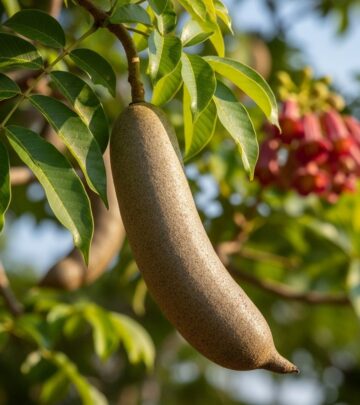12 Delicious Citrus Fruits You Should Definitely Try
These tangy treats deliver a burst of wellness and zest to every bite.

Citrus fruits have long been cherished for their vibrant flavors, vitamin C content, and health-boosting benefits. From the familiar orange to exotic yuzu, each citrus variety offers something unique. This article explores 12 must-try citrus fruits, dives into their nutrition and health benefits, and provides tips for adding these fruits to your meals.
What Are Citrus Fruits?
Citrus fruits belong to the genus Citrus and are grown widely in tropical and subtropical regions. These fruits are typically juicy, tangy or sweet, and have fragrant rinds filled with essential oils. Regular consumption can help fortify your immunity, keep your skin glowing, and provide valuable dietary fiber.
- Main Citrus Varieties: Oranges, lemons, limes, grapefruits, tangerines, pomelos, and more
- Nutrition Highlights: High in vitamin C, flavonoids, fiber, potassium
- Health Benefits: Immunity support, antioxidant activity, skin health, heart health, anti-inflammatory effects
12 Citrus Fruits You Should Try
1. Orange
Oranges are arguably the most popular citrus fruit in the world, available in several varieties such as Navel, Valencia, and Blood oranges.
- Nutrition: Rich in vitamin C, fiber, potassium, and folate
- Flavors: Sweet, mildly tangy
- Uses: Eaten fresh, juiced, or used in desserts and salads
Health Benefits: Oranges boost immune function, improve skin health, and deliver powerful antioxidants to fight inflammation and reduce heart disease risk.
2. Lemon
Lemons are renowned for their tangy taste and refreshing aroma. A kitchen essential, they add zest to water, salads, and desserts.
- Nutrition: Excellent source of vitamin C, helps absorb iron, contains citric acid
- Flavors: Sharp, tart
- Uses: Lemonade, salad dressings, marinades, baking
Health Benefits: Lemons promote digestion, boost collagen production, improve skin radiance, and may help kidney function.
3. Lime
Limes are smaller and greener than lemons, with a distinct tartness and floral undertone. Popular in drinks and regional cuisines.
- Nutrition: Vitamin C, antioxidants, folate, potassium
- Flavors: Intensely tart, fragrant
- Uses: Cocktails (e.g., mojito), curries, salsas, desserts
Health Benefits: Limes help brighten skin, support immunity, and enhance iron absorption. They also aid in detoxifying the body.
4. Grapefruit
Grapefruits are large, pink or red-fleshed, and offer a unique combination of sweetness and bitterness.
- Nutrition: High in vitamin C, A, fiber, and antioxidants like lycopene
- Flavors: Slightly bitter with a hint of sweetness
- Uses: Eaten fresh, juiced, or included in breakfast bowls and salads
Health Benefits: Grapefruit supports weight management, eases digestive issues, and boosts heart health. (Note: May interact with some medications.)
5. Tangerine
Tangerines are small, bright orange fruits, sweet and slightly less acidic than oranges, with loose peels for easy snacking.
- Nutrition: Rich in vitamin C, antioxidants, and more sugar than oranges
- Flavors: Sweet, tangy, aromatic
- Uses: Eaten fresh, in fruit salads, desserts
Health Benefits: Support skin health and immunity, may lower blood pressure and cholesterol, and reduce cancer risk.
6. Clementine
Clementines are seedless hybrids of mandarins and sweet oranges, ultra-sweet and easy to peel; a favorite among children.
- Nutrition: Vitamin C, fiber, slightly lower in acid content
- Flavors: Extra sweet, juicy
- Uses: Snacking, fruit platters, salads
Health Benefits: Excellent for boosting immunity in winter and promoting collagen for healthy skin.
7. Pomelo
Pomelo is the largest citrus fruit, with thick pale green or yellow skin and mildly sweet flesh.
- Nutrition: Vitamin C, potassium, fiber
- Flavors: Mildly sweet, less acidic than grapefruit
- Uses: Eaten fresh, in salads, candied rind
Health Benefits: Pomelo supports digestion, reduces inflammation, and aids heart health.
8. Mandarins
Mandarins are small, thin-skinned, easy to peel, and extremely sweet citrus fruits often used in desserts and juices.
- Nutrition: Vitamin C, beta carotene, fiber
- Flavors: Sweet to mildly tart
- Uses: Snacking, salads, desserts
Health Benefits: Mandarins help keep skin glowing, support immunity, and facilitate healthy digestion.
9. Yuzu
Yuzu is a rare, tart Japanese citrus fruit, aromatic with lime-like notes, prized for its zest and juice.
- Nutrition: Vitamin C, strong anti-inflammatory compounds
- Flavors: Tart, fragrant, floral
- Uses: Japanese cuisine, sauces, cocktails, desserts
Health Benefits: Yuzu promotes relaxation, supports immune defense, and has antiviral properties.
10. Tangelo
Tangelo is a juicy, hybrid fruit of tangerine and grapefruit with a distinctive knobbed stem, ultra-sweet and succulent.
- Nutrition: Vitamin C, fiber
- Flavors: Sweet, mildly acidic
- Uses: Juices, fresh as snacks, fruit salads
Health Benefits: Offers a refreshingly sweet source of vitamin C, boosts hydration.
11. Ugli Fruit
Ugli fruit is a Jamaican hybrid of grapefruit, orange, and tangerine with a wrinkled, greenish-yellow skin and juicy, tangy flesh.
- Nutrition: Vitamin C, dietary fiber
- Flavors: Tangy-sweet, juicy
- Uses: Eaten fresh, added to salsas or salads
Health Benefits: Ugli fruit supports digestion and immunity, and is a refreshing addition to fruit platters.
12. Calamondin
Calamondin is a tiny, sour citrus used mainly in Southeast Asian and Filipino cooking, known for its intense tartness and floral aroma.
- Nutrition: Vitamin C, antioxidants
- Flavors: Very tart
- Uses: As seasoning, in drinks, jams
Health Benefits: Calamondin is rich in antioxidants and vitamins that boost immune function and aid skin vitality.
Nutrient Comparison Table
| Fruit | Vitamin C (mg/100g) | Dietary Fiber (g/100g) | Unique Nutrients |
|---|---|---|---|
| Orange | 53 | 2.4 | Folate, flavonoids |
| Lemon | 77 | 2.8 | Citric acid, potassium |
| Lime | 29 | 2.8 | Flavonoids |
| Grapefruit | 31 | 1.6 | Lycopene, vitamin A |
| Tangerine | 26 | 1.8 | Beta-carotene |
| Clementine | 48 | 1.7 | Low acidity |
| Pomelo | 61 | 1.0 | Pectin, potassium |
| Mandarin | 27 | 1.8 | Beta carotene |
| Yuzu | 40 | Not available | Anti-inflammatory |
| Tangelo | 45 | 1.6 | Hydration |
| Ugli Fruit | 70 | 2.0 | Potassium |
| Calamondin | 38 | Not available | Antioxidants |
How Citrus Boosts Health and Wellness
- Immunity: Vitamin C stimulates white blood cell production and protects against infections.
- Antioxidant Protection: Flavonoids and carotenoids neutralize free radicals and prevent cellular damage.
- Heart Health: Fiber lowers cholesterol, potassium helps regulate blood pressure.
- Skin Health: Citrus acids help lighten dark spots and even out blemishes.
- Weight Management: Low calorie, high-fiber content supports healthy weight loss.
- Digestive Aid: Natural acids and fiber facilitate smoother digestion and regularity.
Tips for Enjoying Citrus Fruits
- Eat them fresh as a snack or mix into fruit salads.
- Make fresh juices, smoothies, or mocktails for a vitamin boost.
- Add zest to marinades, baked goods, soups, and sauces.
- Try candied citrus peel as a sweet treat.
- Use citrus juice to enhance the flavor and nutrition of vegetables and grains.
Citrus for Glowing Skin
Consuming citrus fruits and applying citrus-based treatments can help:
- Lighten dark spots, tan marks, and pigmentation
- Control oily skin and tighten large pores
- Stimulate collagen for firmer, plumper skin
- Reduce signs of aging
DIY citrus masks and scrubs are popular for their refreshing aroma and effectiveness. Always conduct a patch test before trying topical citrus as acids may cause sensitivity.
Nutritional Components of Citrus Fruits
- Vitamin C: Essential for immune function, skin repair, and absorption of iron
- Carotenoids: Antioxidants for vision and skin health
- Folic Acid: Important for cell division and prenatal health
- Potassium: Maintains electrolyte balance and heart health
- Dietary Fiber: Promotes digestion and satiety
Frequently Asked Questions (FAQs)
Q: Which citrus fruit has the highest vitamin C?
A: Lemon and Pomelo are among the richest sources per 100g, but oranges and ugli fruit also provide significant amounts.
Q: Can citrus fruits brighten the skin?
A: Yes, regular consumption and topical application help to lighten uneven skin tone, reduce dark spots and promote a natural glow.
Q: Are citrus fruits good for weight loss?
A: Definitely. Their high fiber and water content keep you full and hydrated while being low in calories.
Q: Is it safe to combine citrus with medications?
A: It depends. Grapefruit in particular may interact with certain drugs; consult a healthcare provider before combining.
Q: Can children eat citrus fruits daily?
A: Yes, citrus fruits are generally safe and nutritious for children, promoting immunity and growth, but check for allergies and avoid overconsumption.
Conclusion: Make Citrus a Daily Habit
Trying a variety of citrus fruits is a simple way to diversify your nutrient intake, boost your health, and experience new flavors. Whether eaten fresh or incorporated into recipes, these vitamin-loaded fruits are a delicious addition to any diet.
References
- https://toneop.care/blogs/citrus-fruits-benefits-for-skin
- https://www.stylecraze.com/articles/tangerine/
- https://www.citrusaustralia.com.au/wp-content/uploads/Health-Benefits-of-Citrus-Fruits-CSIRO-Full-Report.pdf
- https://www.stylecraze.com/articles/citrus-fruits-you-should-definitely-give-a-try/
- https://pmc.ncbi.nlm.nih.gov/articles/PMC6149096/
Read full bio of medha deb












